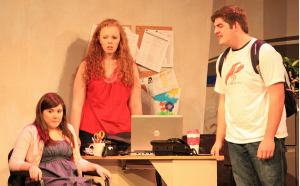The power of social media is all too evident to today’s teenagers.
When technology abuse causes two girls to ruin each other, parents and school officials intervene, struggling to create peace and reconciliation.
This reality is the center of “Exposure,” a play written, directed and performed by Lipscomb students.
“I think it’s a play that speaks particularly to parents, and I hope parents in the audience are encouraged to be good parents, especially in a world that has changed a lot with social media and technology,” said Director Sawyer Wallace, a recent Lipscomb graduate.
The play, written by senior Whitney Vaughn, a double major in theater and Law, Justice and Society, won the playwriting competition at last year’s Christian Scholars’ Conference. It was performed June 6-9 during the 2012 conference on campus.
The Christian Scholars’ Conference annually brings together Christian scholars from various academic backgrounds “to develop their own academic research and to reflect on the integration of scholarship and faith.”
As described in the play’s program, the work is “a riveting play about a high school guidance counselor’s attempt to reconcile two teenage girls who have used social media to destroy each other’s lives. It exposes the pervasive quality of social media and the damaging effects of poor parenting.”
Vaughn, who is interning in Washington, D.C. with the Republican National Committee, said the idea for the play came last year when she was in Mike Fernandez’s playwriting class. Fernandez told the students to consider the big moments in their lives and find common denominators between the events.
“The common denominator in all of the good and bad that I’ve been through, (is) my parents were always there,” said Vaughn. “With every event, I kept thinking how my parents helped me through it. I’m super grateful to them for that. Then I thought of how not everyone is fortunate enough to have two parents who support them in what they do.”
Vaughn said the play is based partially on Ephesians 5 and John 3.
“The reason it’s called exposure is because sometimes we don’t always talk about the things we should be talking about,” she explained. “But if we don’t talk about them, how are we going to spark any change?”
Vaughn said she was surprised that she wrote such a “dark” play.
“I didn’t write a play about a bunch of Christians,” she said. “I wrote a play about people who are broken… because we’re all broken.”
The storyline is “completely manufactured but still grounded in reality,” according to Vaughn. She said she wants people to be exposed to what life is like for teenagers in today’s society and then to want to do something about it.
“I think there’s a very specific audience for this piece,” she said. “It isn’t really my generation. I didn’t write a play for other college students.”
Vaughn, who spoke on a panel about her play before Friday’s performance, said the things in the play are often obvious to college students, but she said older people or young moms may not know what’s happening with teens.
Vaughn said she wanted to “hold a mirror up to society.”
“Exposure” started as a One Act, and then Vaughn was given the opportunity to have a staged reading of her work.
Vaughn said she only entered the play in the competition after Fernandez encouraged her to do so. When she learned she had won the contest, Vaughn said she was shocked.
“I just freaked out,” she said. “I was shaking.”
“I wrote something that is 89 pages long, and to me, that is a feat,” Vaughn said. “I was just so honored to have a staged reading. I basically didn’t know that anyone would ever care about something I wrote. I don’t think I believed in the piece quite as much as Mike did.”
Wallace said the play addresses society’s common response to uncomfortable topics.
“A lot of times really unsettling things in our culture, we try to put things on the margins, ignore it, turn a blind eye to it,” he said. “[This play] makes us aware of the things we are somehow a part of.”
“I know that the people who come are going to walk away really blessed with a meaningful story,” he said. “And I’m really proud of my cast and crew. I think we’ve done a really good job.”
Vaughn said Wallace has been “enthusiastic” through the play’s existence.
“He’s been really supportive,” she said. “I’ve been through so many rewrites of this show, and he’s been with me through all of them. I’m so grateful for that because this is a new vulnerability for me.”
Vaughn said in spite of the vulnerability, she really pushed herself to create something special.
“This is such a rare opportunity,” she explained. “I put a lot of pressure on myself to take a full leap, to push myself to the boundary, almost to the point where it was terrifying for me.”
Vaughn said she didn’t want to simply feel comfortable with the story because she didn’t want to play it safe. “I think I have a better play because of that.”
The play came together because of encouragement and hard work from professors, family and colleagues, Vaughn said.
“The most important thing is that everyone knows I’m so grateful for the opportunity and their patience and their hard work,” she said. “I’m so grateful to know that people were willing to give up their time to tell this story.
“At the end of the day, that’s what matters. It’s been a growing experience for all of us. For theater people, it’s never about the results. It’s about the process and what you take from it.”


